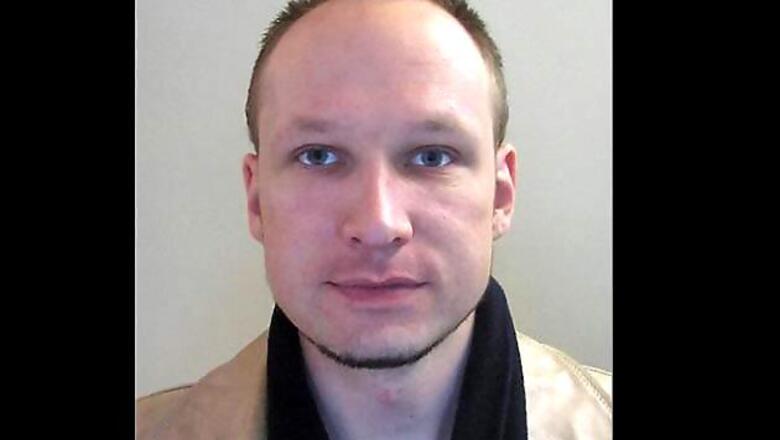
views
Oslo: With a rambling monologue depicting Norway's worst peacetime massacre as a necessary evil, confessed mass killer Anders Behring Breivik got the last word as his 10-week trial ended Friday amid conflicting claims about his sanity.
Relatives of his 77 victims said they hope it's the last they hear of him.
"For me this is not about whether he's mentally competent or not," said Unni Espeland, whose 16-year-old daughter Andrine was killed in Breivik's shooting massacre on a political youth camp. "For me this is about him never being let out again."
Since the self-styled anti-Muslim fanatic admitted to the twin attacks on July 22 - a car bomb in downtown Oslo followed by the shooting spree at the governing Labor Party's youth camp - his sanity was the key issue to be resolved in the trial.
Breivik, 33, rejected prosecutors' assertion that he is insane, but it was unclear whether he helped his case with a closing statement that included complaints against the TV show "Sex and the City" and the Eurovision Song contest.
He demanded to be set free, saying his actions "were preventive attacks to defend the indigenous Norwegian people" and vowed that he would be exonerated by history.
But it was the relatives of victims who left the strongest impression on the court on the final day as they tried to put their loss in words.
Lara Rashid, 17, told the court she was consumed with feelings of guilt for having survived the Utoya massacre, while her two years older sister Bano was killed.
"It should have been me," Rashid said, her voice cracking.
Their Kurdish family fled from Saddam Hussein's Iraq to build a new life in safe and peaceful Norway. Despite the grief and emptiness, Rashid said she had begun to feel hope.
"Bano fought for a multicultural Norway, and at her funeral she showed that a priest and an imam could go side by side," Rashid said.
Kirsti Loevlie, whose 30-year-old daughter Hanne was killed in the bombing, moved the courtroom to tears as she described the shock of finding out her daughter was dead, the grief of cleaning out her room and the first Christmas without her.
Still, Loevlie said she felt a need to attend the trial, seeing Breivik in a position where he couldn't hurt anyone anymore.
"I am not going to be afraid of this man," Loevlie said. "I decided I would go to court. I felt I owed it to Hanne."
The court room burst out in applause and audible sobs as she finished her statement.
Breivik remained motionless, his face blank.
Earlier Friday, defense lawyer Geir Lippestad had tried to prove to the court that Breivik's claims of being a resistance fighter in a struggle to protect Norway and Europe from being colonized by Muslims are not delusional, but part of a political view shared by other right-wing extremists.
"He realized that it is wrong to kill, but he chose to kill. That's what terrorists do," Lippestad said. "The ends justify the means. You don't understand this if you don't understand the culture of right-wing extremists."
Lippestad also formally entered a plea for acquittal, but it was made out of principle, without any realistic chance of success.
When Breivik addressed the court, he lashed out at everything he finds wrong with the world, from the Labor Party's immigration policies, to non-ethnic Norwegians representing the country in the Eurovision Song Contest and the sexually liberated lifestyle of the characters "Carrie" and "Samantha" in "Sex and the City."
"These are the ideals that are presented to our sisters and daughters today," he said. "They should be censored and removed from our society."
Incorporating current events into his statement, he claimed that fellow right-wing extremists were behind a small amount of explosives found outside a Swedish nuclear plant this week. Swedish police spokesman Tommy Nyman said he had no comment, "especially not if he says it."
Two teams of psychiatrists reached opposite conclusions about Breivik's mental health. The first team diagnosed him with "paranoid schizophrenia," a serious mental illness. The second team found him legally sane, saying he suffers from a dissocial and narcissistic personality disorder, but is not psychotic.
Prosecutors on Thursday called for an insanity ruling, saying there was enough doubt about Breivik's mental state to preclude a prison sentence.
The five-judge panel will announce its ruling on Aug. 24, chief judge Wenche Elisabeth Arntzen said.
If deemed mentally competent, Breivik would likely be given Norway's maximum prison term of 21 years. A sentence can be extended beyond that if a prisoner is considered a menace to society. If declared insane, he would be committed to a mental institution for as long as he's considered sick and dangerous to others. Prosecutors suggested Thursday that could mean he would be held for the rest of his life.
Either way, the discussion about what prompted Breivik to commit an atrocity that Norway had never imagined is likely to continue.
"Whether or not he will be declared sane there are political ideas political motives behind this attack," said Eskil Pedersen, the head of the Labor Party's youth wing and an Utoya survivor.




















Comments
0 comment